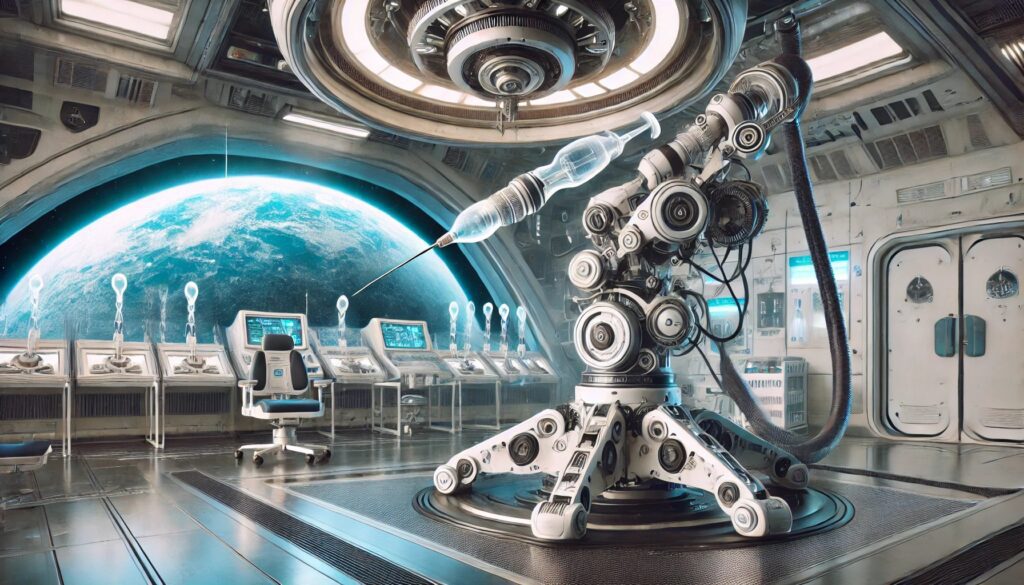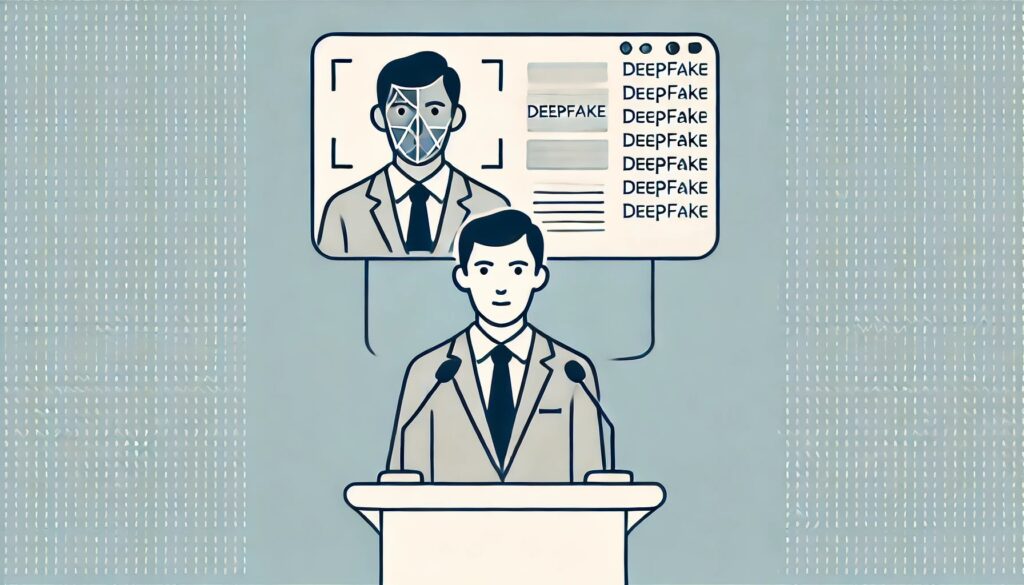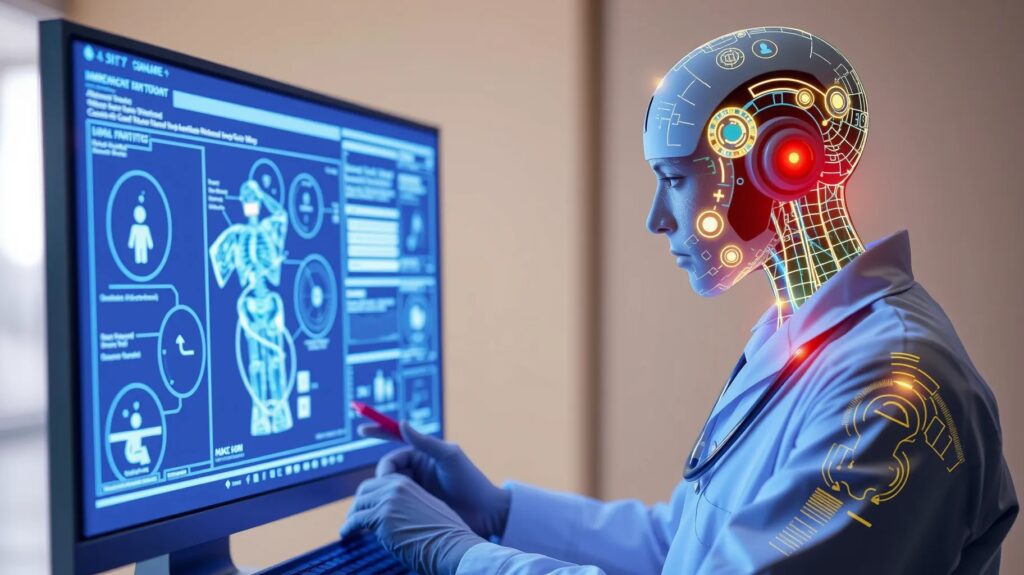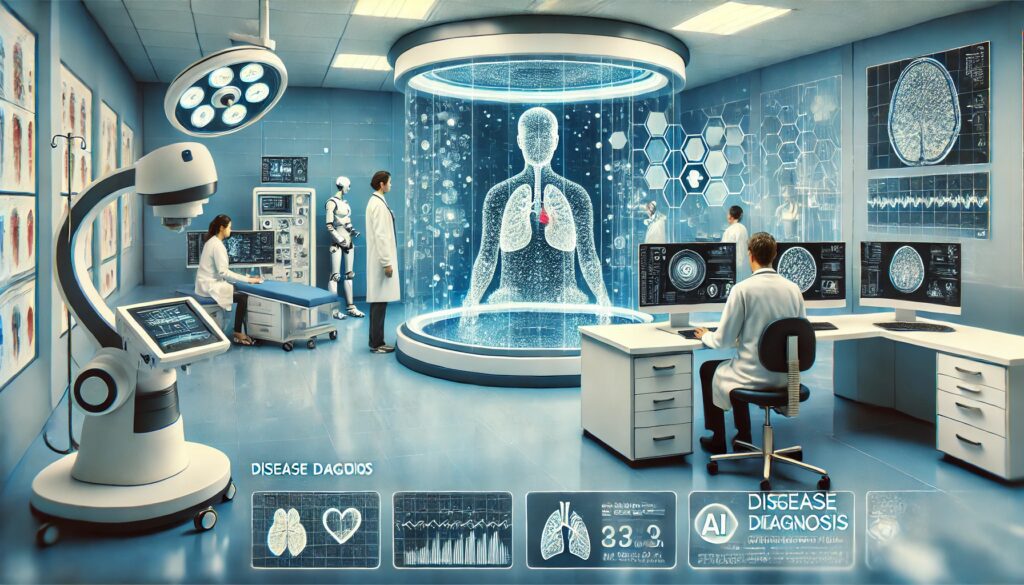
Transforming Healthcare: AI in Disease Diagnosis
AI is no longer a distant dream. It’s here, right now, reshaping the healthcare landscape. One of the most fascinating areas of transformation is disease diagnosis. With unprecedented access to massive data sets, algorithms are learning faster than ever, detecting diseases with precision that humans can struggle to match. From the way we diagnose chronic illnesses to how we interpret complex medical imagery, AI has begun to revolutionize the field. Yet, it’s only the beginning, and the full potential remains untapped. This shift is truly transformational in every sense.
Revolutionizing diagnostics: AI’s edge over traditional methods
The traditional methods of diagnosing diseases have been long-standing and generally reliable, but they often come with limitations. Time-consuming, reliant on human interpretation, and prone to occasional errors, conventional diagnostics leave room for improvement. AI is changing all of this by introducing automated systems capable of analyzing data faster and with more consistency. These systems can spot patterns in data that would be invisible to the naked eye, allowing physicians to make more informed decisions. This not only boosts the accuracy but also speeds up the process of diagnosing patients, often cutting the waiting period significantly.
How AI enhances early disease detection
Early detection can be the difference between life and death, particularly in cases of aggressive diseases like cancer. AI’s ability to process vast amounts of patient data—ranging from medical history to real-time monitoring of vital signs—enables it to detect subtle indicators of disease much earlier than human doctors might. Machine learning algorithms can learn from previous cases and recognize symptoms that may otherwise be overlooked, leading to earlier intervention and potentially saving lives. AI doesn’t just diagnose; it anticipates, giving patients a better fighting chance.
Real-time data processing: A game-changer in medical diagnostics
Gone are the days when doctors had to sift through piles of paperwork or wait hours for lab results. AI now offers real-time data processing, which completely transforms the way diagnoses are made. Imagine an AI system that receives data from wearable health devices, continuously tracking patients’ health metrics. If it detects anything unusual—perhaps a sudden drop in heart rate or abnormal glucose levels—it can alert healthcare providers in real-time. This means that rather than waiting for scheduled check-ups, patients can receive immediate attention when they need it most.
Accuracy at its peak: AI-driven imaging technologies
Medical imaging has always been a cornerstone of disease diagnosis, but AI is elevating it to new heights. With AI-driven technologies like deep learning applied to MRI, CT scans, and X-rays, medical professionals can identify conditions that are difficult to detect with the human eye alone. AI algorithms are trained to recognize minute details, from the early signs of Alzheimer’s disease to subtle tumors missed by traditional methods. These systems offer a level of precision that not only improves diagnosis but also enhances the monitoring of disease progression over time, leading to more proactive treatments.
The role of AI in predicting disease outbreaks
One of the most unexpected yet impactful ways AI is transforming healthcare is in its ability to predict disease outbreaks. By analyzing vast datasets that include social media trends, environmental data, and patient reports, AI can detect patterns that signal the emergence of infectious diseases. This early-warning system allows governments and healthcare providers to take preventive measures before outbreaks spiral out of control. During the COVID-19 pandemic, AI tools were used to map and predict the spread of the virus, giving health authorities a head start in responding to the crisis.
AI’s impact on rare disease identification
Rare diseases often go undiagnosed for years, with patients seeing multiple doctors before receiving a correct diagnosis. AI, however, can drastically reduce this diagnostic journey. By sifting through genomic data and cross-referencing with clinical symptoms, AI can pinpoint rare diseases that are easily overlooked in the traditional healthcare setting. Machine learning models trained on rare disease data are making it easier to connect unusual symptoms with specific disorders. This not only shortens diagnosis time but also opens doors to treatment options much earlier in the process, improving patient outcomes.
Medical Imaging Analysis
AI is revolutionizing medical imaging analysis. Advanced algorithms analyze X-rays, MRIs, and CT scans to detect abnormalities like tumors, fractures, and lesions with remarkable accuracy. Deep learning models, especially convolutional neural networks (CNNs), excel in image recognition, enabling early detection of diseases like cancer. This early detection is crucial for timely intervention and better patient outcomes.

Bridging healthcare gaps with AI-based tools
One of the most exciting potentials of AI in diagnostics is its ability to bridge healthcare gaps, especially in underserved regions. Many parts of the world lack access to trained healthcare professionals or advanced medical technology. AI can fill this void by offering remote diagnostic tools that allow patients in remote areas to receive accurate diagnoses without needing to travel to major cities. AI-powered mobile health apps and diagnostic devices can help screen for conditions like diabetes or cardiovascular diseases, offering timely intervention even in the most inaccessible locations.
AI and its potential in cancer detection
Few areas of healthcare have been as impacted by AI as oncology. The potential of AI in cancer detection is astounding, especially when it comes to identifying early-stage cancers. Whether through analyzing biopsy results or scanning mammograms, AI is proving to be a powerful ally in the fight against cancer. In some cases, AI systems have even been shown to outperform human radiologists in detecting early signs of breast cancer. By catching these cancers earlier, patients have a better chance at survival, and treatments can be less invasive.
Researchers have developed an AI tool called AINU that uses nanoscale imaging to detect early signs of cancer and viral infections. The system, trained on high-resolution cell images, identifies subtle changes in cell nuclei that occur during cancer development or viral infection. This breakthrough could lead to faster diagnosis and monitoring of diseases, offering potential improvements in stem cell research and reducing reliance on animal testing. However, challenges remain in making this technology clinically accessible.
— For more details, visit the article here.
Enhancing Pathology
In pathology, AI systems assist in analyzing tissue samples to identify cancerous cells swiftly. Digital pathology platforms use AI to provide deeper insights, significantly speeding up the diagnostic process. This integration reduces human error and enhances the precision of diagnoses.
Genomics and Personalized Medicine
AI’s role in genomics is transformative. By analyzing genomic data, AI identifies genetic markers linked to specific diseases. This paves the way for personalized medicine, where treatment plans are tailored to an individual’s genetic profile. Machine learning models predict a person’s susceptibility to certain conditions, revolutionizing preventive healthcare.
Electronic Health Records (EHR) Analysis
AI algorithms efficiently sift through extensive electronic health records (EHRs) to identify patterns and predict disease outbreaks, patient readmissions, and potential complications. Natural Language Processing (NLP) techniques extract valuable information from unstructured clinical notes, enhancing patient data analysis and improving healthcare management.
Predictive Analytics
Predictive analytics in healthcare forecasts disease progression and patient outcomes by examining historical data and identifying risk factors. This proactive approach helps manage patients more effectively, reducing the burden on healthcare systems and preventing complications before they arise.
AI in Drug Development
AI accelerates drug development by identifying potential drug targets and predicting drug efficacy and toxicity. This significantly shortens the drug development timeline. For instance, AI-assisted drug DSP-1181 reached pre-clinical trials within 12 months, compared to several years in traditional processes (SpringerLink) (SpringerLink) (SpringerLink).
Overcoming Challenges
Despite its potential, integrating AI in healthcare faces challenges like data privacy, the need for large annotated datasets, and integrating AI tools into existing clinical workflows. Developing explainable AI models is crucial for transparency and gaining trust among healthcare professionals and patients.
Pathology and Histopathology
AI in pathology revolutionizes how pathologists work. AI systems analyze tissue samples, identifying cancerous cells swiftly, which speeds up the diagnostic process. These systems significantly reduce human error, providing highly accurate results. Digital pathology platforms equipped with AI enhance human expertise by offering deeper insights into complex cases. This synergy between AI and pathologists not only improves diagnostic accuracy but also ensures faster treatment decisions, leading to better patient outcomes.
Genomics and Personalized Medicine
AI in genomics is paving the way for tailored healthcare. By analyzing genomic data, AI identifies genetic markers associated with specific diseases, enabling the creation of personalized treatment plans. Machine learning models predict an individual’s susceptibility to certain conditions based on their genetic makeup. This approach transforms preventive healthcare, making treatments more effective and targeted.
Electronic Health Records (EHR) Analysis
AI revolutionizes the analysis of electronic health records (EHRs). AI algorithms sift through vast amounts of EHR data to identify patterns and predict disease outbreaks, patient readmissions, and potential complications. Natural Language Processing (NLP) techniques extract valuable information from unstructured clinical notes, enhancing the comprehensiveness of patient data analysis. This advanced data analysis improves healthcare management and patient outcomes.
Innovative Predictive Analytics
Predictive analytics in healthcare, powered by AI, forecasts disease progression and patient outcomes by analyzing historical data and identifying risk factors. Predictive models assist in proactive patient management, reducing the burden on healthcare systems and preventing complications before they arise. This proactive approach enhances patient care and optimizes resource allocation in healthcare facilities.
AI in Drug Development
AI accelerates drug development by identifying potential drug targets and predicting drug efficacy and toxicity. This significantly shortens the drug development timeline. For instance, AI-assisted drug DSP-1181 reached pre-clinical trials within 12 months, compared to several years in traditional processes.
Overcoming Challenges
Despite its potential, integrating AI in healthcare faces challenges like data privacy, the need for large annotated datasets, and integrating AI tools into existing clinical workflows. Developing explainable AI models is crucial for transparency and gaining trust among healthcare professionals and patients.
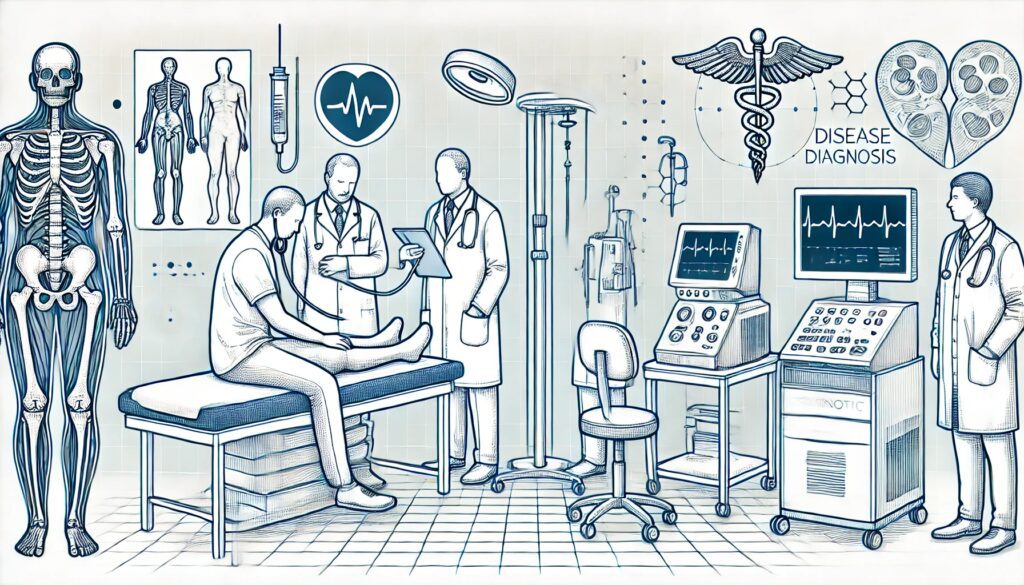
Benefits of AI in Disease Diagnosis
Improved Accuracy
AI systems significantly reduce diagnostic errors by providing consistent and objective analyses. This consistency leads to early and accurate detection, which is crucial for better patient outcomes. AI’s ability to analyze vast datasets ensures that even the most subtle abnormalities are identified, enhancing the precision of diagnoses.
Efficiency and Speed
AI streamlines the diagnostic process, allowing for quicker decision-making and reducing the time to treatment. Automated systems handle large volumes of data swiftly, alleviating workload pressures on healthcare professionals. This efficiency means patients receive timely care, which can be critical in managing diseases effectively.
Accessibility
AI-powered diagnostic tools can be deployed in remote and underserved areas, providing access to quality healthcare where it was previously unavailable. Mobile health applications leverage AI to offer diagnostic services to individuals without immediate access to medical facilities. This accessibility ensures that more people can benefit from early diagnosis and treatment, improving overall public health.
Challenges and Considerations
Data Quality and Privacy
The accuracy of AI models hinges on the quality and diversity of the training data. High-quality, diverse datasets ensure that AI can make reliable predictions across various populations. Ensuring patient data privacy and adhering to regulatory standards is crucial. Protecting sensitive information while using it to train AI models presents a significant challenge that healthcare providers must navigate carefully.
Integration with Healthcare Systems
Seamless integration of AI tools with existing healthcare infrastructure requires significant investment and adaptation. This process includes upgrading systems and ensuring compatibility between AI technologies and current healthcare software. Training healthcare professionals to effectively use AI systems is essential for maximizing their potential benefits. Comprehensive training programs are necessary to help medical staff understand and trust AI-assisted diagnoses.
Ethical and Legal Implications
Addressing biases in AI algorithms is critical to prevent disparities in healthcare outcomes. AI models can inadvertently perpetuate biases present in their training data, leading to unequal treatment of different patient groups. Establishing clear legal frameworks for AI deployment in healthcare is necessary to manage liability and accountability. These frameworks ensure that AI usage in healthcare is fair, transparent, and legally sound, protecting both patients and providers.
Future Prospects
Enhanced Collaboration
Collaboration between AI developers, healthcare providers, and regulatory bodies will drive innovation and ensure the safe implementation of AI in clinical settings. This partnership is essential for addressing the technical and ethical challenges posed by AI. Interdisciplinary research will foster the development of more robust and reliable AI models. By bringing together experts from various fields, we can create AI systems that are both effective and trustworthy.
Continuous Learning
AI systems will evolve with continuous learning, improving their diagnostic capabilities over time. These systems will integrate real-time data, allowing for real-time data integration and feedback loops, which will enhance the precision and adaptability of AI tools. This continuous improvement ensures that AI remains up-to-date with the latest medical knowledge and practices, providing the best possible care.
Patient-Centric Care
AI will enable more personalized and patient-centric care, tailoring treatments to individual needs and preferences. By analyzing comprehensive patient data, AI can suggest personalized treatment plans that consider a patient’s unique health profile. Empowering patients with AI-driven health insights will promote proactive health management. Patients will have access to detailed health information, helping them make informed decisions about their care and lifestyle.
Conclusion
Artificial Intelligence holds immense potential to revolutionize disease identification and diagnosis, offering significant benefits in terms of accuracy, efficiency, and accessibility. While challenges remain, ongoing advancements and collaborations will pave the way for AI to become an integral part of modern healthcare, ultimately improving patient outcomes and transforming the landscape of medical diagnostics.
For more information on AI advancements in healthcare, explore detailed articles and research studies on

